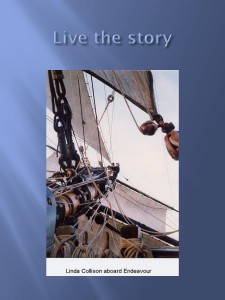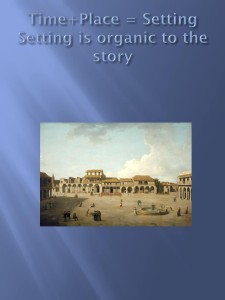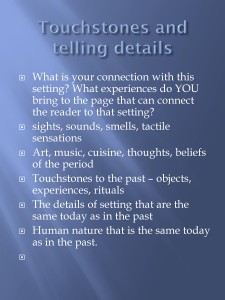 Here are a few of the slides from my power point outline, Beyond Research, shared at the Rocky Mountain Fiction Writer’s spring Genre Con, May 14, at Table Mountain Inn in Golden, Colorado. The keynote and morning session was given by Kristin Nelson and Angie Hodapp of Nelson Literary Agency. The afternoon was devoted to craft in genre breakout sessions.
Here are a few of the slides from my power point outline, Beyond Research, shared at the Rocky Mountain Fiction Writer’s spring Genre Con, May 14, at Table Mountain Inn in Golden, Colorado. The keynote and morning session was given by Kristin Nelson and Angie Hodapp of Nelson Literary Agency. The afternoon was devoted to craft in genre breakout sessions.
Rebecca Bates — Mystery Linda Collison — Historical Fiction Nathan Lowell — SciFi/Fantasy
Bernadette Marie — Romance Aaron Michael Ritchey — YA
The works-in-progress of the writers in my group is indicative of the wide spectrum of historical novels being written and published today. Our stories include historical mystery, historical fantasy, historical paranormal, historical adventure, literary historical, family sagas, fictional memoir, and contemporary novels with strong historical elements. Interest in historical fiction has never been stronger.
The importance of setting is something all historical fiction has in common — and it’s generally agreed that these stories takes place before the author was born, usually set 50 years or more in the past. Setting isn’t arbitrary; a story happens in a particular place and time for a reason. Setting affects character, plot, mood, and tone. 
But how do we go beyond gathering events, dates, and second-hand details to make our setting feel real? How can we bring first-hand authenticity to the page?
While there are effective techniques a writer can use to enhance setting, credibility can’t really be crafted. The old “write what you know best” is what leads to convincing settings.
To tap into our own individual wells of verisimilitude we discussed our personal connections to our stories. I asked the group to consider:
What drew you to write about your particular time & place? How did you fall in love with your setting? What problems does your character face that are inherent to the setting?
What areas of expertise do you have; what skills, hobbies, and life experiences can you take back to the past with you to enrich your story and add meaningful and credible detail?
For me, it was my sailing experiences and my nursing experiences. Another woman has a biomedical background, having worked for the Federal Drug Administration. She takes her 21st century knowledge in writing about medieval herbalists and apothecaries. Several writers had a deep interest in genealogy and were writing novels based on the immigration stories of their own ancestors. These personal connections and experiences give our stories conviction and authority and direct our focus. We bring our own past and passions to the page.
Discovering your personal connection to the story and using it with authority gives your work verisimilitude. It’s also part of your author platform. Be sure to mention it in your bio; use it to engage your readers.
